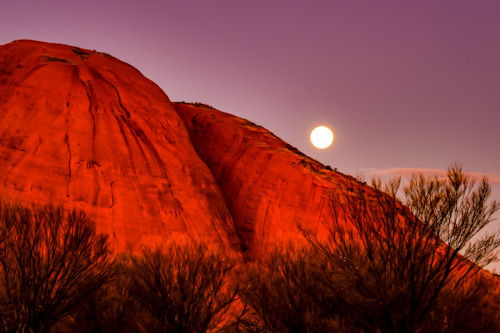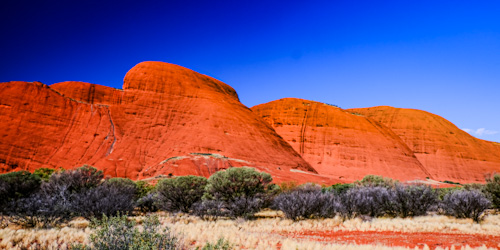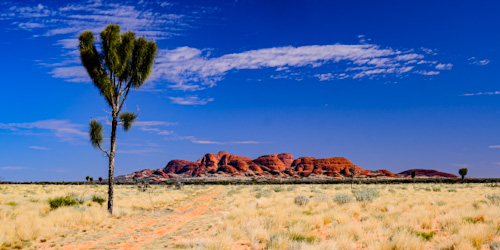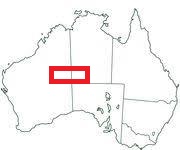

Movie Stage VI
| start date | activity | place | from - to | days | km | km/ day | comment |
| 31.05 | Desert cart | Gibson Desert | Patjarr - Gunbarrel Hwy | 3 | 103 | 34 | weak, wet, water poisoning |
| 3.06 | Desert cart | Old Gunbarrel Hwy | Wanarn Turn off - Warakurna | 5 | 152 | 32 | 4 spokes broken in 1 wheel |
| 8.06 | Desert cart | Great Central/Tjukaruru Rd | Warakurna - Kata Tjuta | 7 | 307 | 44 | Long hours in cold conditions |
| 15.06 | Desert cart | Uluru NP | Kata Tjuta - Yulara | 1 | 32 | 32 | Beautiful 4WD track |
| 16.06 | Organising | Yulara | 2 | 10 |
 When I arrived to Patjarr settlement, the village looked abandoned. I walked around a couple of houses, yelled, and nothing. Fortunately, after a while someone called me, and I breathed a sigh of relief. Shane was the first person I saw after 22 days of not seeing any human. He immediately invited me over, as he announced that only he with his wife live in the village. Unfortunately, it also meant that the store has been shut down a long time ago.
When I arrived to Patjarr settlement, the village looked abandoned. I walked around a couple of houses, yelled, and nothing. Fortunately, after a while someone called me, and I breathed a sigh of relief. Shane was the first person I saw after 22 days of not seeing any human. He immediately invited me over, as he announced that only he with his wife live in the village. Unfortunately, it also meant that the store has been shut down a long time ago.
An aboriginal couple immediately gave me a room, provided with shower, access to a fridge, I felt relaxed with them. Of course, I was surprised by the difference between our Western standards and their habits on many levels, but I am not in position to judge, I knew too little about the subject from their point of view.
First of all, I was hungry, my body screamed for carbohydrates, I tried not to eat all thier food, the hours passed and I only thought about eating. And so throughout the evening and the next day, we sat in front of the house, warming ourselves by the campfire. Lazily enjoying doing nothing. Looking into the horizon. Watching camels walking around the village. We spoke from time to time. I quickly realized that these people have good hearts, you just have to see it. As a farewell, Shane gave me a self-defense heavy stick that he had carved from mulga tree, a great souvenir of this place. Dadina, on the other hand, once told about her traditional life in the desert, which was written by her friend Marion Hercock in the book "Born in the desert: The land and travels of a last Australian nomad" with insights from Dadina Brown. Mandatory reading for me. And the most important - the Aborigines gave me their food supplies for eight days of walking (to the next store), although in terms of nutrition I would prefer a slightly more varied diet, but complaining in such circumstances would be inappropriate. They didn't even accept payment.
 After a day of rest, I moved on. It didn't take long and my stomach started to hurt, then I got diarrhea, finally aching bones and vomiting. As if that was not enough, the rain and the cold were putting me down too. And since the tent had already served up a bit during 2013 unmotorised South America crossing - the fly was leaking, so I slept with my hat over my face to prevent it from dropping directly on me.
After a day of rest, I moved on. It didn't take long and my stomach started to hurt, then I got diarrhea, finally aching bones and vomiting. As if that was not enough, the rain and the cold were putting me down too. And since the tent had already served up a bit during 2013 unmotorised South America crossing - the fly was leaking, so I slept with my hat over my face to prevent it from dropping directly on me.
The next day I pushed hard again, even though I was still sick, only to get to the rainwater tank - here I exchanged all the water I carried, because it was most likely the cause of my sickness. But the highlight of the day was the meeting my Aborigines friends - the village "carer" returned and gave Shane and Dadina a car to drive to the store. Of course, as they passed me, they offered to buy me what I needed - I gave them cash and after nearly 4 hours I saw them returning with my box of fruits, sweets, bread, ham, cheese, cola etc. Heaven on earth, I came back to life!
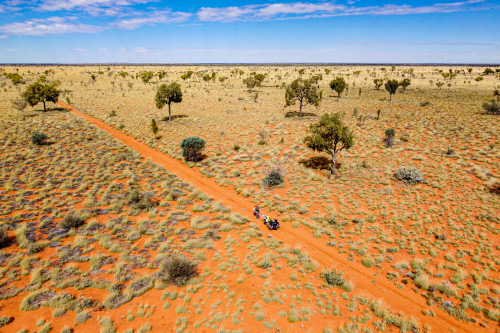
I couldn't replace the spokes, so I decided to tighten the others - that's how the fourth spoke broke, all on one side of the hub. This is the end of the journey, I thought. After all, I am in a remote area, what should I do? I came up with four scenarios - call for help; put the backpack on me with water and walk to the nearest settlement; move two spokes from a healthy wheel and have two not weak nor strong wheels; shift the heavy weight over the "healthy" wheel and keep light stuff over the "weak" wheel.
 I decided on the last version, walking in such a way that the broken wheel was on the flat surface of the car tire marks all the time, and with the healthy one to overcome all wood and grass obstacles. Of course, I knew that I would not get that far, so I sent a text message to the next roadhouse if any tourists were going in my direction and would bring spare spoke nuts with them. Unfortunately, the manager must have misunderstood me and called the police, who immediately let me know that they were on their way to me. It took me a while to explain to them that I was still moving and had plenty of food and water, so eventually the policewoman replied that she finally had all the correspondence and everything was fine.
I decided on the last version, walking in such a way that the broken wheel was on the flat surface of the car tire marks all the time, and with the healthy one to overcome all wood and grass obstacles. Of course, I knew that I would not get that far, so I sent a text message to the next roadhouse if any tourists were going in my direction and would bring spare spoke nuts with them. Unfortunately, the manager must have misunderstood me and called the police, who immediately let me know that they were on their way to me. It took me a while to explain to them that I was still moving and had plenty of food and water, so eventually the policewoman replied that she finally had all the correspondence and everything was fine.
 Now I misunderstood them and they actually were going to check wealfare on me anyway - they woke me up at 10 p.m. They got a bit lost, so it took them about 8 hours to reach me, but it surprised me how nice and friendly two officers were. They talked to me for 15 minutes and they jumped into their two cars and they left. It was a pity that they did not bring the spoke nibbles with them, but they mentally ensured me that if the wheel fell apart, they would come to rescue me. It gave me a lot of psychological comfort.
Now I misunderstood them and they actually were going to check wealfare on me anyway - they woke me up at 10 p.m. They got a bit lost, so it took them about 8 hours to reach me, but it surprised me how nice and friendly two officers were. They talked to me for 15 minutes and they jumped into their two cars and they left. It was a pity that they did not bring the spoke nibbles with them, but they mentally ensured me that if the wheel fell apart, they would come to rescue me. It gave me a lot of psychological comfort.
I think the confidence thry gave me was too big, because I started pouring water out to minimise the weight on the cart. And the impossible became possible - I was walking very carefully, listening for something breaking down, very slowly through the more difficult sections where the weak wheel had to bounce a bit on the obstacles. I don't know how real it is, but I did a difficult 140km rough track with a wheel without 4 spokes. When I got to Warakurna after 5 days, the policemen were very happy, they invited me to the police station for tea and handed out the spare spoke nibbles!
 The wheel in the evening was repaired - next morning I moved on. Somehow I wasn't happy to walk on Great Central Road, too many cars dusting me. And here's a surprise - there were only about 3 cars per hour, and after a few days I entered the mountainous terrain - I couldn't get over how beautiful it was. After all, while walking, I can see all the colors of the day - from sunrise to sunset, so I come across these wonderful shades. I was delighted.
The wheel in the evening was repaired - next morning I moved on. Somehow I wasn't happy to walk on Great Central Road, too many cars dusting me. And here's a surprise - there were only about 3 cars per hour, and after a few days I entered the mountainous terrain - I couldn't get over how beautiful it was. After all, while walking, I can see all the colors of the day - from sunrise to sunset, so I come across these wonderful shades. I was delighted.
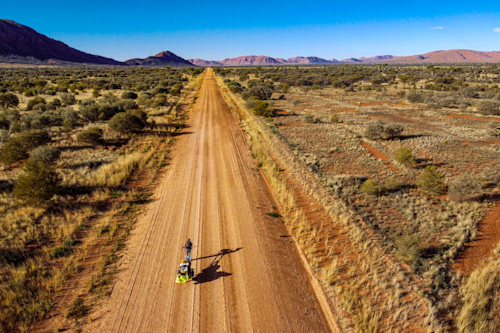
And another miracle - the cart was light so I walked faster. It was so cold so my breaks were reduced to minimum. And something struck me - if I walk more than 10 hours a day and stop for less than 3 hours, then I have a theoretical chance to make it to the full moonrise just before sunset at the majestic rocks of Kata Tjuta. In addition, on my birthday. And I fell into a spiral of personal best's - 9 years ago my greatest distance in one day with towing the cart was 43 km, here I have the shortest days of the year, and I did 47 km, the next day 52, and the following one the record of 54 km. I can barely walk, muscles ache, feet almost fall off. In addition, I couldn't go to sleep quickly because you can't buy methylated spirit in Aboriginal villages (for my cooking system), so every evening I had to collect firewood and light a campfire (time-consuming and unpleasant if there was a strong cold wind). Although it allowed tired muscles to warm up. I fall asleep after 10pm and 7 hours later again at the action. And in the morning the temperature was close to freezing - all clothes on, including a beanie and gloves. It wasn't easy.
